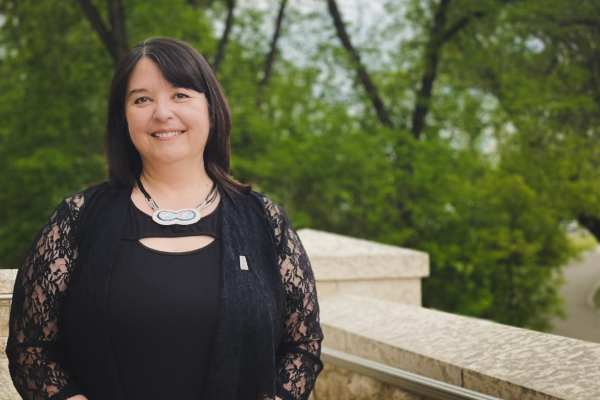
Fired by twin passions
Susan Shacter is driven by a hunger for knowledge and a desire to advocate for her community.
By Joanne Paulson for JSGSThe poet W.B. Yeats once said, “Education is not the filling of a pail, but the lighting of a fire.”
Susan Shacter’s flame, to continue the metaphor, has burned brightly for 30 years.
It wasn’t easy for the recent Johnson Shoyama Master’s Certificate graduate (2022) to claim her education. As a first-generation high school and post-secondary graduate, university seemed like a daunting prospect — financially and otherwise.
From a little Métis community on the edge of Hinton, Alberta, Shacter mostly grew up in Battleford. Her family largely hails from the Bresaylor, Langmeade, and Bjelde Creek areas, although they travelled far and wide after leaving the Red River in the 1880s.
She is a Métis Nation - Saskatchewan (MN-S) citizen and a member of Gabriel Dumont Local 11 (GD11).
“It literally took me 30 years to get my undergrad degree because my family didn’t have money for school,” she said.
“I took my first university classes back in 1988 and over the years I would take classes whenever I could afford to. I transferred in classes from SIAST, from Okanagan University. Wherever I was living, I would take a class whenever I could find the money. “And I will keep going to university for the rest of my life.”
Indeed, she is now pursuing her Master’s in political studies at the University of Saskatchewan, while continuing to work in areas that support her research. It was a similar scenario when she came to JSGS while working for the university in recruitment as an Indigenous Liaison Officer.
“We would do training with JSGS because we also did recruitment for grad studies,” Shacter explained. “I had been considering pursuing graduate studies for some time, but as a first-generation high school and post-secondary graduate, the prospect of pursuing further education seemed mysterious and intimidating. However, the MCert programs at JSGS provided an excellent opportunity to jump in and start without making a full-time commitment. I was able to take classes while still working full-time, which was very convenient.”
Knowledge is one of Shacter’s primary passions. The other is supporting her community.
“I’m an advocate at heart. I’m an advocate for my community. I’m always looking to do what I can to improve situations for my community.”
To that end, she is working with the Métis Nation – Saskatchewan (MN-S) as part of a team consulting with community members and elected officials to reform its constitution and related legislation.
“It is an incredibly exciting project, and I feel privileged to be a part of it,” Shacter said. “Additionally, I am part of a team developing a Métis Court, which will be crucial to supporting the development of self-government for the Métis Nation within Saskatchewan. “This is a historic time for the Métis Nation, and I am thrilled to play a role in this process.”
Her work at MN-S also directly informs her research as a master's student, which focuses on political trust-building within the Métis Nation as it supports constitution building.
“Through this research, I hope to contribute to the ongoing efforts to build stronger, more resilient Métis communities," she said.
But that’s not all. She is also newly part of a team, as a Community Research Facilitator, with the nātawihowin and mamawiikikayaahk Research, Training and Mentorship Networks, within the Saskatchewan NEIHR (Saskatchewan Network Environments for Indigenous Health Research).
“In this role, I will work with researchers, community partners, graduate students, Elders, and knowledge keepers to facilitate research projects in Métis and First Nations communities in Saskatchewan,” she said. “I'm particularly excited about the Saskatchewan NEIHR's work with their partner Métis Nation-Saskatchewan to develop Métis health research data governance principles.”
Shacter credits her experience at, and degree from, JSGS for advancing her goals and expertise.
“The instructors were incredibly supportive, and the course loads were manageable, which helped me stay on track with my studies,” she said. “Through the Economic Analysis for Public Policy program, I was able to complete a graduate certificate in a relatively short amount of time, which provided me with personal, academic, and professional benefits.
“Successfully completing the MCert program gave me the confidence to move forward with pursuing a master's degree. In fact, two of my certificate classes were even able to count towards credit for the master's program I am currently enrolled in.”
Shacter said she would recommend JSGS to anyone looking for a high-quality graduate program. The school's commitment to student success, combined with its supportive faculty and staff, make it “an excellent choice for anyone looking to advance their career or pursue further education.”
When asked how she manages to balance her work and high-level education, she shares, “I am fortunate to love everything I'm doing, and that helps me find ways to fit everything in, but it can be challenging. I regularly reprioritize, and try to keep in mind that there’s always tomorrow.”

